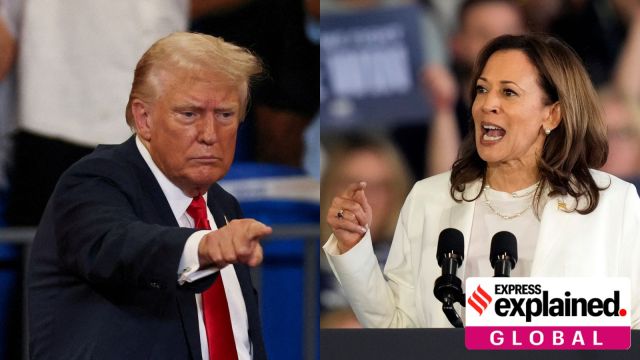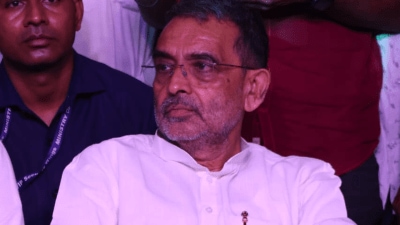An expert explains | View from China on Kamala Harris replacing Biden, the possibility of Trump 2.0
While China avoided officially commenting on Trump vs Biden, that did not stop its online commentators and strategic experts, one of whom called the American leaders ‘two bowls of poison’ for Beijing. With Harris now in the fray, some in China have hoped for her win.
 Democratic presidential nominee Vice President Kamala Harris and Republican presidential nominee and former U.S. President Donald during their campaign rallies. (Via AP/PTI and REUTERS)
Democratic presidential nominee Vice President Kamala Harris and Republican presidential nominee and former U.S. President Donald during their campaign rallies. (Via AP/PTI and REUTERS)Until July 12, no one doubted the US presidential election this November to be a Trump-Biden rematch. With the world’s eyes on the contest, China concealed its unease and nervousness as both candidates were tough on China, and competed to be more so during their campaigns.
China officially maintained an apathetic stance, saying, “Neither candidate is appealing to Beijing.” Then, three things happened in quick succession, and China’s strategic affairs community found itself drawing up strategies for China to confront the US under Trump 2.0.
Ten days that shook the world
The three dramatic events were an assassination attempt on Trump on July 13; Biden announcing the withdrawal of his candidature on July 21; and the US Vice President Kamala Harris emerging as the new Democratic Party frontrunner candidate on July 23.
A day before the assassination attempt, mainstream state-backed Chinese media outlets were widely reporting the “twin” shocks the 81-year-old Biden gave to Democratic Party supporters. The popular news website guancha.cn carried a story highlighting Biden’s “stumbling and error-filled” disastrous first-round televised debate with Trump, and his faltering speech at the NATO summit in Washington.
Interestingly, in contrast with the official Chinese stance, analysts in China have expressed strong and conflicting opinions. Zhao Minghao, an International Relations professor at Fudan University in Shanghai, remarked that the results didn’t matter for China as Biden and Trump would be “two bowls of poison.”
On the other hand, Wang Jian, an independent foreign affairs analyst based in Shanghai, contrasted Trump’s rigid “decoupling” theory on moving away from trade with China with Biden’s relatively more flexible position. He said China prefers a predictable Biden, who despite applying more stringent anti-China trade policies, has repeatedly stated that the US must maintain “contact with China.”
The view on Trump
On his decision, Biden said nothing should hinder “saving American democracy”, including “my personal ambitions.” Several Chinese scholars said that besides his failing health and poor debate performance, the real reason was the sudden escalation in Trump’s popularity following the assassination attempt.
A commentary article in Chinese media on July 25 said, “After Trump escaped the shooting, Biden’s chances of winning were very slim, so he simply withdrew to save face. If there had not been that sudden shooting, Biden would not have withdrawn.”
When it comes to Trump, China’s IR scholars and foreign affairs experts hold him responsible for pushing US-China relations to a point of no return for two reasons. First, Trump started an anti-China trade war in 2018, with tariffs imposed on Chinese imports. Second, as the Covid-19 virus spread in the US, Trump was seen as deflecting criticism of his handling of the pandemic by blaming China.
Candidate Trump’s views on Taiwan are also viewed scornfully. In a recent interview with Bloomberg, Trump accused Taiwan of taking away the semiconductor industry from the US and stealing American jobs, demanded Taiwan must “pay for US defending Taiwan”, and cited their geographical distance to argue against any US intervention in the island state in the face of Chinese aggression.
Trump is also seen as having violated four decades of “One-China policy” and diplomatic practice when he spoke with Taiwan President Tsai Ing-wen on the telephone in 2016, after winning the US elections.
‘Mediocre’ Kamala Harris no match for Trump
Within days of Biden endorsing Harris, the White House declared her the most qualified person for the job. Many Chinese commentators disagreed with that view. Einar Tangen, a senior fellow with a Beijing-based think tank, told South China Morning Post that the chances of Harris defeating Trump are even smaller compared to Biden. “She has not really been very visible… She has not really been able to handle any major policy initiatives,” he said.
Professor Shen Dingli, a Shanghai-based internationally well-known Sino-US relations expert, told voachinese.com that in the June debate, neither candidate criticised the other on China policy. Shen argued that Biden proudly claimed the US trade deficit with China during his term came to its lowest since 2010, but this actually meant “praising Trump’s political achievement in disguise.”
Professor Shen recently told SCMP that if Harris proposes tougher anti-China policies to compete with Trump, it will be tantamount to her falling into a political trap.
The day after Harris lashed out at Trump in her maiden campaign speech as a nominee, Dow Jones’ MarketWatch column in morningstar.com reported how China’s social media was brimming with anti-Harris, pro-Trump posts. It observed the rumours and sexist attacks targeting Harris on China’s Weibo and Little Red Book, apps similar to X and Instagram, were recycled from those promulgated by far-right American influencers. Author Tanner Brown claimed many such posts came from Chinese or Chinese-American users in the US.
While Chinese authorities are usually known for heavily regulating and censoring cyberspace, they have ignored personal attacks and slander targeting a top American woman politician.
However, one recent trending post argued Harris could win. “Of course, between Trump and Harris, the former is no doubt a far stronger candidate. But Harris is weak and that actually works to her advantage. For, the deep dark forces in the US always want people who are easy to manipulate. To Trump’s disadvantage, he has strong opinions and a strong personality,” it said.
The article added that whatever the final election results are, one thing is certain — the United States will be plunged into a political mess not experienced before. It said Trump’s Make America Great Again (‘MAGA’) and the associated America-first ideas are bound to lead to a decline in the US economy and hegemony. “On one hand, Harris’ victory will not be accepted by Trump and his supporters and will cause chaos. On the other hand, lack of ability and ineffective governance under Harris will accelerate the US decline,” it said.
To sum up, US elections-related online chatter is not merely a source of entertainment on the Chinese internet. It also reflects serious political hostility between rival ideological factions among China’s intelligentsia.
Hemant Adlakha teaches Chinese at the Jawaharlal Nehru University in New Delhi. He is also Vice Chairperson and an Honorary Fellow, Institute of Chinese Studies (ICS), Delhi.



- 01
- 02
- 03
- 04
- 05



































